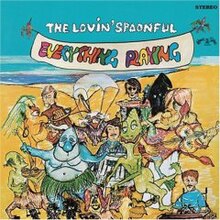Everything Playing
 From Wikipedia the free encyclopedia
From Wikipedia the free encyclopedia
| Everything Playing | ||||
|---|---|---|---|---|
 | ||||
| Studio album by | ||||
| Released | December 6, 1967[1] | |||
| Studio | Mira Sound, New York City[2] | |||
| Genre | Folk rock[3] | |||
| Length | 32:23 | |||
| Label | Kama Sutra | |||
| Producer | Joe Wissert The Lovin' Spoonful | |||
| The Lovin' Spoonful chronology | ||||
| ||||
| Singles from Everything Playing | ||||
Everything Playing is the fourth studio album by the American folk-rock band the Lovin' Spoonful, released in December 1967.
History
[edit]Everything Playing was the first album featuring guitarist Jerry Yester (replacing Zal Yanovsky who left shortly after recording "Six O'Clock") and the last commercial album as a quartet; principal songwriter and lead singer John Sebastian would leave the group in June 1968 for a solo career. This album also features the only known track to feature bassist Steve Boone on lead vocal: "Priscilla Millionaira".
Three of the songs made the Top 40: "Six O'Clock," "She Is Still a Mystery," and "Money". John Sebastian sang "Younger Generation" in his unscheduled appearance at Woodstock, dedicating it to an audience member whose wife or girlfriend had had a baby at the festival.[7]
The songs were recorded at Mirasound Studios in Manhattan using a prototype 16-track tape recorder which was custom built for the studio by Ampex.[8] This was one of the earliest recordings to use 16-track technology.
Everything Playing was re-issued on CD in 2003 with three bonus tracks — alternate versions of songs from the original recording.
Reception
[edit]| Review scores | |
|---|---|
| Source | Rating |
| Allmusic | |
| Rolling Stone | (negative)[10] |
| Encyclopedia of Popular Music | |
| MusicHound Rock | 3/5[12] |
| Uncut | |
In his Allmusic review, music critic William Ruhlman wrote of the album "When Sebastian wasn't at the mic, the singing could be mediocre, and the group was often all over the map in its attempt at musical sophistication, but the record was saved by Sebastian's writing and singing."[9]
Track listing
[edit]All songs by John Sebastian unless otherwise noted.
Side one
- "She Is Still a Mystery" – 3:00
- "Priscilla Millionaira" – 2:20
- "Boredom" – 2:23
- "Six O'Clock" – 2:38
- "Forever" (Steve Boone) – 4:24
Side two
- "Younger Generation" – 2:40
- "Money" – 2:01
- "Old Folks" (Joe Butler) – 3:04
- "Only Pretty, What a Pity" (Butler, Jerry Yester) – 3:04
- "Try a Little Bit" – 3:04
- "Close Your Eyes" (Sebastian, Yester) – 2:44
Personnel
[edit]- John Sebastian – vocals, guitar, cover art
- Steve Boone – bass, vocals
- Joe Butler – drums, percussion, vocals
- Jerry Yester – guitar, banjo, vocals, keyboards
- Zal Yanovsky - guitar on "Six O'Clock"
References
[edit]- ^ Ruppli & Novitsky 1998, p. 357.
- ^ Boone & Moss 2014, p. 181.
- ^ Nelson, Paul (1980). "Folk Rock". In Miller, Jim (ed.). The Rolling Stone Illustrated History of Rock and Roll (Revised and Updated ed.). New York City: Random House. pp. 231–234. ISBN 0-394-73938-8 – via the Internet Archive.
- ^ Ruppli & Novitsky 1998, p. 306.
- ^ Ruppli & Novitsky 1998, p. 342.
- ^ Anon. (1990). Anthology (Liner notes). The Lovin' Spoonful. Rhino. R2 70944.
- ^ Fornatale, Pete. Back to the Garden: The Story of Woodstock. Touchstone, 2009, p. 51–52. ISBN 978-1-4165-9119-1.
- ^ "Mirasound Studios, NY".
- ^ a b Ruhlman, William. "Everything Playing > Review". Allmusic. Retrieved June 15, 2011.
- ^ "Robert Greenburg. Rolling Stone. Vol. 1 No. 6. February 24, 1968. p20". Archived from the original on March 28, 2013. Retrieved March 20, 2012.
- ^ Larkin, Colin (2007). Encyclopedia of Popular Music (4th ed.). Oxford University Press. ISBN 978-0195313734.
- ^ Rucker, Leland (1996). "Lovin' Spoonful / John Sebastian". In Graff, Gary (ed.). MusicHound Rock: The Essential Album Guide. Detroit, Michigan: Visible Ink Press. pp. 422–423. ISBN 0-7876-1037-2 – via the Internet Archive.
- ^ Stannard, Joe (July 2003). "The Lovin' Spoonful: Hums of the Lovin' Spoonful / Everything Playing". Uncut. No. 74. p. 134.
Sources
[edit]- Boone, Steve; Moss, Tony (2014). Hotter Than a Match Head: My Life on the Run with The Lovin' Spoonful. Toronto: ECW Press. ISBN 978-1-77041-193-7 – via Google Books.
- Ruppli, Michel; Novitsky, Ed, eds. (1998). The MGM Labels: 1961–1982. Westport, Connecticut: Greenwood Publishing Group. ISBN 978-0-313-30779-9 – via Google Books.